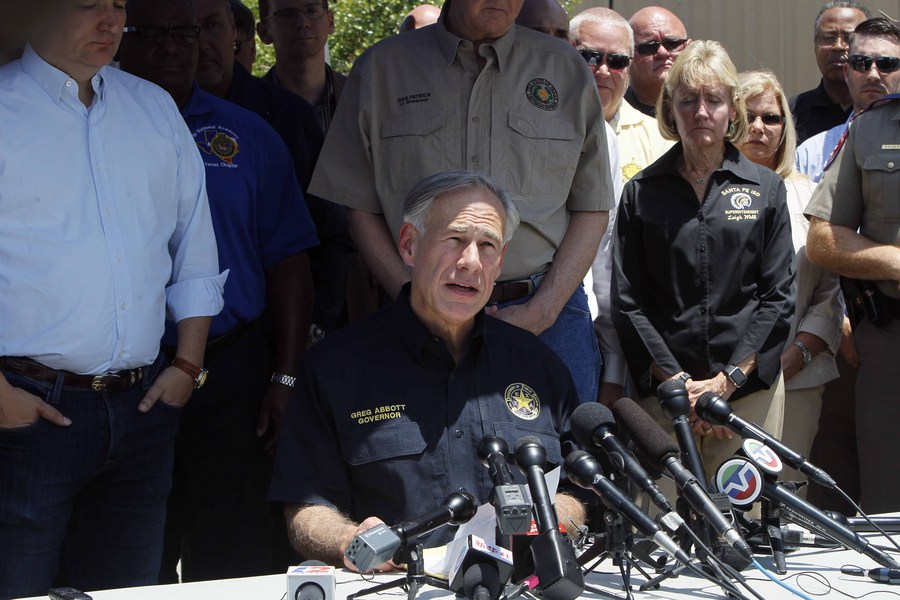U.S. reaffirms COVID-19 vaccine mandates amid party-line, individual opposition

People enjoy themselves along the waterfront in the Brooklyn borough of New York, the United States, June 15, 2021. (Xinhua/Michael Nagle)
Experts fear the United States is bumping up against the ceiling of persuadable people, one that is significantly lower than the threshold needed for broad immunity from Delta and, possibly, future variants. "The overwhelming majority of eligible adults who remain unvaccinated in the United States are hard-core refusers," The New York Times reported.
NEW YORK, Oct. 12 (Xinhua) -- The U.S. federal government is striving to persuade more people to get vaccinated on their own, or push ahead with mandates, while party-line action, vaccine hesitancy and even resistence still uphold in some states and sectors against the Democratic administration's universal call for vaccination against the coronavirus.
"We've obviously been trying very hard," Anthony Fauci, chief medical advisor to the U.S. president, told CNN on Monday. "We try to get trusted messengers out there and try and get this away from being an ideological or political statement, get back into the realm of pure public health, and try to convince people."
There is evidence that mandates are working in academic settings and at corporations such as airlines, and the best way for the United States to assure that a decline in cases, hospitalizations and deaths will continue is to get "a lot more" people vaccinated, added Fauci, also director of the National Institute of Allergy and Infectious Diseases.
The number of Americans getting a dose of COVID-19 vaccine has jumped to about 1 million a day, and the rate of people getting booster shots is now outpacing the rate of people getting their first doses. However, about a quarter of the eligible U.S. population remains unvaccinated against coronavirus, according to official figures.

A man takes a COVID-19 test at a testing van in Times Square in New York, the United States, Oct. 2, 2021. (Photo by Michael Nagle/Xinhua)
Tuesday's vaccination updates by the U.S. Centers for Disease Control and Prevention (CDC) showed that 216,889,814 people had received at least one dose of COVID-19 vaccine, making up 65.3 percent of the whole U.S. population. Fully vaccinated people stood at 187,215,471, accounting for 56.4 percent of the total. In addition, 7,786,263 people, or 4.2 percent of fully vaccinated group, received booster shots.
Meanwhile, according to The New York Times (NYT) data analysis, the 7-day average of confirmed cases of the pandemic stood at 89,526 nationwide on Monday, with the 14-day change striking a 24-percent fall. The COVID-19-related deaths were 1,853 on Monday, with the 14-day change realizing a 10-percent decrease.
PARTY LINE
U.S. states with stricter restrictions to combat the COVID-19 pandemic led by Democratic governors had a lower spread of the virus than Republican-led states, according to a new research published on the American Journal of Preventative Medicine, which underscores how preventative restrictions have been "politicised" and that it is health professionals who should be calling the shots.
Researchers from the Binghamton University calculated a Public Health Policy Index (PPI) to determine how stringent a state's public health policies were, and analysed those findings against the state's transmission of COVID-19 and the governor's political affiliation, finding that states with Democratic governors had a PPI that was 10 points higher on average than states with Republican governors.
On average, the 10-point difference in PPI led to an eight percent increase in the expected number of COVID-19 cases in most Republican-governed states between March and November 2020 when the national number of COVID-19 cases peaked. "The main lesson of this research is that better public health requires a less partisan approach to the making of public health policies," said a statement by the study's co-author Olga Shvetsova.

Texas Governor Greg Abbott speaks at a press briefing in Santa Fe, Texas, the United States, May 18, 2018. (Xinhua/Steven Song)
Republican state officials have always been doubling down on their pandemic-related efforts. Texas businesses and other private entities are banned from requiring COVID-19 vaccinations for employees, Governor Greg Abbott, a Republican, said in an executive order issued on Monday. "The COVID-19 vaccine is safe, effective, and our best defense against the virus, but should remain voluntary and never forced," he said.
Coming in response to the federal government pushing large businesses to require vaccines for employees, Abbott's order makes no exception for hospitals and healthcare facilities, many of which require vaccines for COVID-19, flu and other communicable diseases because patients may be immunocompromised or too young to be vaccinated. His order applies only to the COVID-19 shot, allowing entities to require vaccines for other diseases.
Until now, elected officials in Texas have banned governmental entities from requiring vaccines and have banned places of public accommodation from requiring vaccines of their customers, but have allowed private businesses to determine whether to require vaccinations of their staff.
REFUSAL STRONGHOLD
Millions of U.S. adults are not covered by the vaccine mandates. Experts fear the country is bumping up against the ceiling of persuadable people, one that is significantly lower than the threshold needed for broad immunity from Delta and, possibly, future variants. "The overwhelming majority of eligible adults who remain unvaccinated in the United States are hard-core refusers," reported NYT on Tuesday.
The arrival of boosters is making efforts to coax the unvaccinated even more difficult. In a September survey from the Kaiser Family Foundation, 71 percent of unvaccinated respondents said the need for boosters indicated that the vaccines were not working. "This vaccine has tested me like nothing before and I've been doing this for 40 years," Gary Wiltz, director of the Franklin health center, was quoted as saying.
About 56 percent of the U.S. population is fully vaccinated, a level that exceeds some early estimates about what it could take to achieve so-called herd immunity against the coronavirus. That percentage will surely rise once the shots are authorized for children under 12. But Delta is so contagious that experts have revised their optimum coverage estimates to 90 percent or higher, according to the report.

A Metropolitan Transportation Authority (MTA) staff member distributes free masks and hand sanitizers for subway riders at a subway station in Manhattan of New York, the United States, June 8, 2020. (Xinhua/Wang Ying)
One vaccine news hard for commuters to swallow was that, at the Metropolitan Transportation Authority (MTA), a public benefit corporation responsible for public transportation in the New York City (NYC) metropolitan area, "the full accurate number" of its workers who have received at least one shot is 71 percent to 75 percent, far lower than the city's overall -- roughly 84 percent of adults in NYC have gotten at least one COVID-19 shot.
An agency mandate that went into effect at the start of last week requires all MTA employees to provide proof of a COVID-19 vaccination or a weekly negative test in order to work. "The MTA's low vaccination rate combined with last week's mandate could worsen a dire crew shortage that has for months crippled city subway and bus service," reported New York Daily News on Monday.
Given the MTA's estimate, anywhere from 4,200 to 6,800 of the agency's employees have received shots but for some reason declined to provide proof. If the resistence sustains, the agency will have to confirm the workers' vaccination status if they got their shots at an MTA or New York State facility, and asks all other workers to submit their proof of vaccination through an online portal.
Photos
Related Stories
- UK's early response to COVID-19 one of worst public health failures: report
- Chinese mainland reports 12 new imported COVID-19 cases
- In pics: air show of annual Fleet Week activities in San Francisco
- Compelled to part ways with Chinese suppliers, small U.S. telecom providers risk survival
- U.S. warns of "twindemic" prior to holiday season with COVID-19 pill, booster vaccines in clearance
Copyright © 2021 People's Daily Online. All Rights Reserved.










